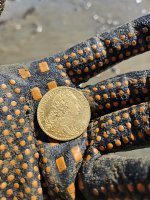treasurehunterfromWA
Tenderfoot
- May 11, 2012
- 5
- 5
- Detector(s) used
- Bounty Hunter Landstar
- Primary Interest:
- Cache Hunting
Hello,
My name is Phillip I just recently purchased a Bounty Hunter Landstar and would like some advice to get started with it.
My name is Phillip I just recently purchased a Bounty Hunter Landstar and would like some advice to get started with it.




